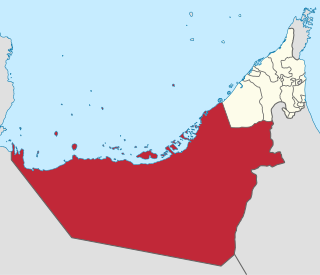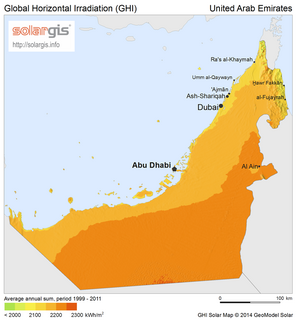
The economy of the United Arab Emirates is the second largest in the Middle East, with a gross domestic product (GDP) of USD 414 billion in 2018.

Khalifa bin Zayed bin Sultan Al Nahyan is the current President of the United Arab Emirates, the Emir of Abu Dhabi, the Supreme Commander of the United Arab Emirates Armed Forces and the chairman of the Supreme Petroleum Council. Sheikh Khalifa is also chairman of Abu Dhabi Investment Authority, which manages $875 billion in assets, the largest amount managed by a nation's head of state in the world. Collectively, the Al Nahyan family is believed to hold a fortune of $150 billion.

The Office of Gas and Electricity Markets (Ofgem), supporting the Gas and Electricity Markets Authority (GEMA), is the government regulator for the electricity and downstream natural gas markets in Great Britain. It was formed by the merger of the Office of Electricity Regulation (OFFER) and Office of Gas Supply (Ofgas).

Ahmed Ali Al Sayegh is a Minister of State in the United Arab Emirates since September 2018 and Chairman of Abu Dhabi Global Market (ADGM), the International Financial Centre in the UAE's capital city.

The Abu Dhabi National Oil Company or ADNOC is the state-owned oil company of the United Arab Emirates (UAE). According to the Oil & Gas Journal, as of January 2015, the UAE holds the seventh-largest proven reserves of oil in the world at 97.8 billion barrels. Most of these reserves are located in Abu Dhabi. It is the world's 12th largest oil company by production, producing 3.1 million barrels per day. It is the UAE's largest company.

The Emirate of Abu Dhabi is one of seven emirates that constitute the United Arab Emirates (UAE). It is the largest emirate by area, accounting for approximately 87 percent of the total land area of the federation. Abu Dhabi also has the second largest population of the seven emirates. In June 2011, it was estimated to be 2,120,700 people, of which, 439,100 people were Emirati citizens. The city of Abu Dhabi, after which the emirate is named, is both the capital of the emirate and federation.
Mubadala Investment Company PJSC (Mubadala) is a state-owned holding company that can be characterized as a sovereign wealth fund. It was established in January 2017 as a Public Joint Stock Company, merging the Mubadala Development Company and the International Petroleum Investment Company, and is a wholly owned investment vehicle of the government of Abu Dhabi, in the United Arab Emirates.
Following its independence from British occupation in 1971, the United Arab Emirates’ media landscape had already started some of its media sectors and continued to develop steadily. Since then, much of the UAE’s media outlets fall under government-owned umbrella groups as well as regulation by the National Media Council and its extensions. The major types of UAE media are print press, radio, television, internet and social media.

United Kingdom enterprise law concerns the ownership and regulation of organisations producing goods and services in the UK, European and international economy. Private enterprises are usually incorporated under the Companies Act 2006, regulated by competition law and insolvency law, while almost one third of the workforce and half of the UK economy is in enterprises subject to special regulation. Enterprise law mediates the rights and duties of investors, workers, consumers and the public to ensure efficient production, and deliver services that UK and international law sees as universal human rights. Labour, company, competition and insolvency law create a general rights for stakeholders, and set a basic framework for enterprise governance, but rules of governance, competition and insolvency are altered in specific enterprises to uphold the public interest, as well as civil and social rights. Universities and schools have traditionally been publicly established, and socially regulated, to ensure universal education. The National Health Service was set up in 1946 to provide everyone free health care, regardless of class or income, paid for by progressive taxation. The UK government controls monetary policy and regulates private banking through the publicly owned Bank of England, to complement its fiscal policy. Taxation and spending composes nearly half of total economic activity, but this has diminished since 1979.

Abu Dhabi is the capital and the second-most populous city of the United Arab Emirates. It is also the largest of the UAE's seven emirates. The city of Abu Dhabi is located on an island in the Persian Gulf, off the Central West Coast. Most of the city and the Emirate reside on the mainland connected to the rest of the country. As of 2020, Abu Dhabi's urban area had an estimated population of 1.48 million, out of 2.9 million in the emirate of Abu Dhabi, as of 2016.
The Department of Municipal Affairs (DMA, Arabic: دائرة الشؤون البلدية Daerat Alsho'on Albaladeya, was established in May 2007. It replaced the Department of Municipalities and Agriculture to act as the focal point of municipal planning and to oversee public works projects in the Emirate of Abu Dhabi, United Arab Emirates.
The electricity sectors of the Republic of Ireland and Northern Ireland are integrated and supply 2.5 million customers from a combination of coal, peat, natural gas, wind and hydropower.

The Abu Dhabi National Energy Company, PJSC (TAQA) is a government controlled energy holding company of Abu Dhabi, United Arab Emirates.
The three cities of Abu Dhabi Emirate within the United Arab Emirates – the coastal city Abu Dhabi itself as well as the inland oases Al Ain and Liwa – receive their drinking water supply entirely from desalinated seawater.
Nigerian Electricity Regulatory Commission(NERC) is an independent regulatory body with authority for the regulation of the electric power industry in Nigeria. NERC was formed in 2005 under the Obasanjo administration’s economic reform agenda through the Electric Power Sector Reform Act, 2005 for formation and review of electricity tariffs, transparent policies regarding subsidies, promotion of policies that are efficient and environmentally friendly, and also including forming and enforcing of standards in the creation and use of electricity in Nigeria. NERC was instituted primarily to regulate the tariff of Power Generating companies owned or controlled by the government, and any other generating company which has a license for power generation and transmission of energy, and distribution of electricity.
The Environment Agency – Abu Dhabi (EAD) is a governmental agency established in 1996 in Abu Dhabi, United Arab Emirates (UAE), committed to protecting and managing biodiversity, providing a clean environment and promoting sustainable development in the Emirate of Abu Dhabi.

Solar power in the United Arab Emirates has the potential to provide most of the country's electricity demand. While being a major oil producing country, the United Arab Emirates (UAE) has taken steps to introduce solar power on a large scale. However, solar power still accounts for a small share of energy production in the country. The country was the 6th top carbon dioxide emitter per capita in the world in 2009, with 40.31 tonnes, but is planning to generate the vast majority of its electrical energy by 2050 from solar and nuclear sources.

Sharjah Electricity and Water Authority also popularly known as SEWA is a government utility in the Emirate of Sharjah which provides electricity, water and natural gas to all its residents. It supplies the same to over 300,000 consumers It has its own bottled drinking water subsidiary known as Zulal which has its factory located in Rahmania area.

His Excellency Sheikh Abdulla Bin Mohamed Bin Butti Al Hamed is the Chairman of the Department of Health in the Emirate of Abu Dhabi and a member of Abu Dhabi Executive Council
Massar Solutions is a publicly traded global transportation and logistics company headquartered in UAE.











